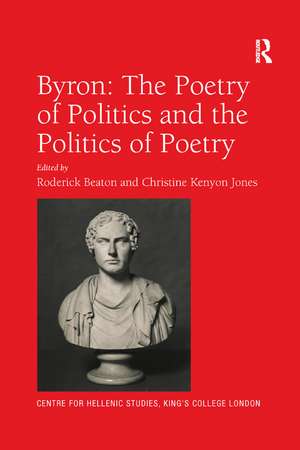Byron: The Poetry of Politics and the Politics of Poetry: Publications of the Centre for Hellenic Studies, King's College London
Editat de Roderick Beaton, Christine Kenyon Jonesen Limba Engleză Paperback – 12 dec 2019
| Toate formatele și edițiile | Preț | Express |
|---|---|---|
| Paperback (1) | 259.98 lei 6-8 săpt. | |
| Taylor & Francis – 12 dec 2019 | 259.98 lei 6-8 săpt. | |
| Hardback (1) | 1064.01 lei 6-8 săpt. | |
| Taylor & Francis – 5 iul 2016 | 1064.01 lei 6-8 săpt. |
Din seria Publications of the Centre for Hellenic Studies, King's College London
- 18%
 Preț: 1000.27 lei
Preț: 1000.27 lei - 18%
 Preț: 1000.27 lei
Preț: 1000.27 lei - 18%
 Preț: 1057.89 lei
Preț: 1057.89 lei - 18%
 Preț: 1061.81 lei
Preț: 1061.81 lei -
 Preț: 489.26 lei
Preț: 489.26 lei - 31%
 Preț: 763.78 lei
Preț: 763.78 lei - 26%
 Preț: 819.90 lei
Preț: 819.90 lei - 18%
 Preț: 1068.91 lei
Preț: 1068.91 lei -
 Preț: 394.51 lei
Preț: 394.51 lei - 16%
 Preț: 263.56 lei
Preț: 263.56 lei -
 Preț: 385.96 lei
Preț: 385.96 lei -
 Preț: 463.58 lei
Preț: 463.58 lei - 21%
 Preț: 256.78 lei
Preț: 256.78 lei -
 Preț: 432.87 lei
Preț: 432.87 lei -
 Preț: 419.65 lei
Preț: 419.65 lei - 18%
 Preț: 1004.55 lei
Preț: 1004.55 lei -
 Preț: 309.70 lei
Preț: 309.70 lei
Preț: 259.98 lei
Preț vechi: 326.49 lei
-20% Nou
Puncte Express: 390
Preț estimativ în valută:
49.75€ • 53.20$ • 41.48£
49.75€ • 53.20$ • 41.48£
Carte tipărită la comandă
Livrare economică 18 aprilie-02 mai
Preluare comenzi: 021 569.72.76
Specificații
ISBN-13: 9780367880743
ISBN-10: 0367880741
Pagini: 300
Dimensiuni: 156 x 234 mm
Greutate: 0.45 kg
Ediția:1
Editura: Taylor & Francis
Colecția Routledge
Seria Publications of the Centre for Hellenic Studies, King's College London
Locul publicării:Oxford, United Kingdom
ISBN-10: 0367880741
Pagini: 300
Dimensiuni: 156 x 234 mm
Greutate: 0.45 kg
Ediția:1
Editura: Taylor & Francis
Colecția Routledge
Seria Publications of the Centre for Hellenic Studies, King's College London
Locul publicării:Oxford, United Kingdom
Cuprins
Peter Cochran: an appreciation, Kenyon Jones / Introduction, Beaton and Kenyon Jones / Part I Politics of Writing and Reading: Byron criticism in the age of Margaret Thatcher and Michael Foot, Gross / Byron’s lyrics and the politics of publication, Stauffer / Byron’s manipulation of authors and addressees in his comical political poems, Modrzewska / Byron and the politics of writing women, Camilleri / She walks in beauty like the night in which all cows are black: Byron’s nonhuman, Morton / Byron, Orwell, politics and the English language, Graham /Part II Politics in the poetry: The politics and poetry of Byron’s Romantic Hellenism: fragmentation as a discursive strategy in The Giaour, Procházka / Poetry, politics and prophecy: The Age of Bronze, The Vision of Judgement and The Prophecy of Dante, Beatty / Byron the Cynic, Havard / Systems and their boundaries: Byron’s poetry and politics in Italy, Böhm / The politics of Don Juan, Cochran / ‘A wilderness of the most rare conceits’: imagining politics in the English cantos of Don Juan, O’Neill / Byron and the politics of heroic transformation, Horová / Part III ‘When a man hath no freedom to fight for at home…’: ‘I am not made for what you call a politician’: Byron’s silent parliamentary experiences, Kenyon Jones / Byron and the ‘Spanish Patriots’: the poetry and politics of the Peninsular War (1808-1814), Coletes-Blanco / History, prophecy, revolution: Italian politics in Byron and Foscolo, Mucignat / From Risorgimento to Fascism: the politics of Parisina, Pal-Lapinski / Childe Harold’s Pilgrimage, British travellers to Greece and the ‘idea of Europe’, Grammatikos / The politics of altruism, Minta / Byron and Greece: lessons in ‘political economy’, Beaton / Afterword, Hamilton.
Notă biografică
Roderick Beaton is Koraes Professor of Modern Greek and Byzantine History, Language and Literature, and Director of the Centre for Hellenic Studies, at King’s College London.
Christine Kenyon Jones is a Research Fellow in the Department of English at King’s College London.
Christine Kenyon Jones is a Research Fellow in the Department of English at King’s College London.
Descriere
'It is no great matter, supposing that Italy could be liberated, who or what is sacrificed. It is a grand object - the very poetry of politics.’ So wrote Lord Byron in his journal in February 1821. For a poet whose life and work are interlaced with action of multiple sorts, little attention has been devoted to Byron’s engagement with issues of poli
















